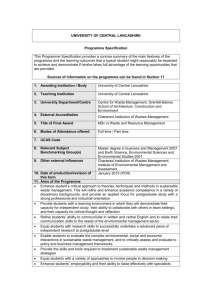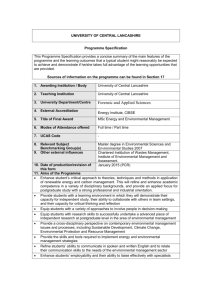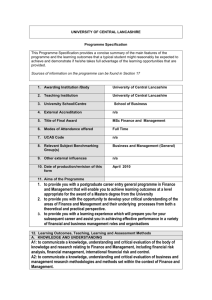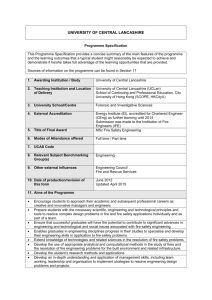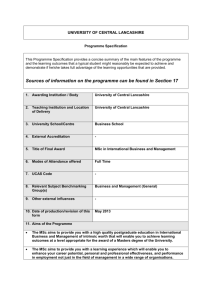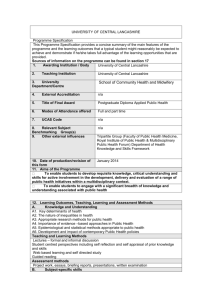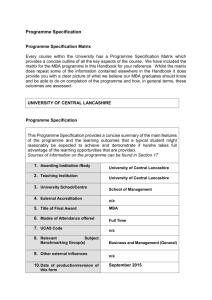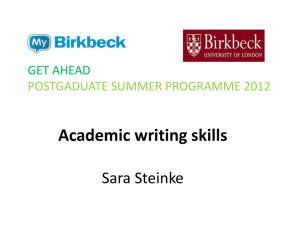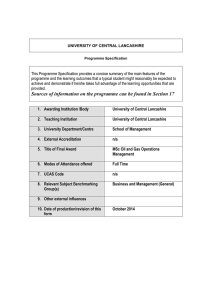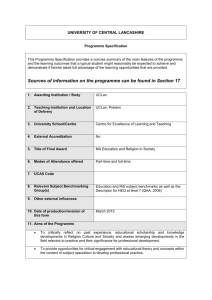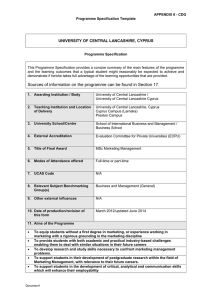Programme Specification - University of Central Lancashire
advertisement
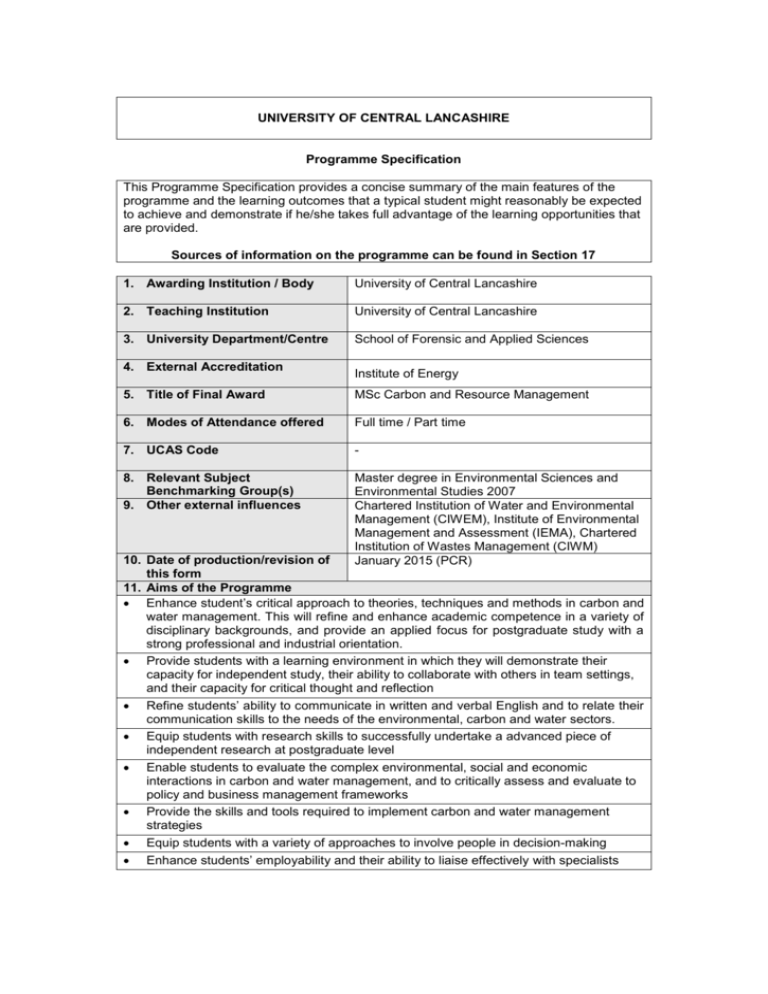
UNIVERSITY OF CENTRAL LANCASHIRE Programme Specification This Programme Specification provides a concise summary of the main features of the programme and the learning outcomes that a typical student might reasonably be expected to achieve and demonstrate if he/she takes full advantage of the learning opportunities that are provided. Sources of information on the programme can be found in Section 17 1. Awarding Institution / Body University of Central Lancashire 2. Teaching Institution University of Central Lancashire 3. University Department/Centre School of Forensic and Applied Sciences 4. External Accreditation Institute of Energy 5. Title of Final Award MSc Carbon and Resource Management 6. Modes of Attendance offered Full time / Part time 7. UCAS Code - 8. Relevant Subject Benchmarking Group(s) 9. Other external influences Master degree in Environmental Sciences and Environmental Studies 2007 Chartered Institution of Water and Environmental Management (CIWEM), Institute of Environmental Management and Assessment (IEMA), Chartered Institution of Wastes Management (CIWM) January 2015 (PCR) 10. Date of production/revision of this form 11. Aims of the Programme Enhance student’s critical approach to theories, techniques and methods in carbon and water management. This will refine and enhance academic competence in a variety of disciplinary backgrounds, and provide an applied focus for postgraduate study with a strong professional and industrial orientation. Provide students with a learning environment in which they will demonstrate their capacity for independent study, their ability to collaborate with others in team settings, and their capacity for critical thought and reflection Refine students’ ability to communicate in written and verbal English and to relate their communication skills to the needs of the environmental, carbon and water sectors. Equip students with research skills to successfully undertake a advanced piece of independent research at postgraduate level Enable students to evaluate the complex environmental, social and economic interactions in carbon and water management, and to critically assess and evaluate to policy and business management frameworks Provide the skills and tools required to implement carbon and water management strategies Equip students with a variety of approaches to involve people in decision-making Enhance students’ employability and their ability to liaise effectively with specialists 12. Learning Outcomes, Teaching, Learning and Assessment Methods A. Knowledge and Understanding Students will be able to: A1 Evaluate carbon and water strategies at Global, National and Regional scales. A2 Evaluate and assess carbon and water management and planning for organisations A3 Critically evaluate the role of regulation and policy in environmental management A4 Utilise IT software packages to present information in an appropriate fashion. A5 Evaluate research methodology and documenting research/field work Teaching and Learning Methods Teaching will be through lectures, case studies, seminars and site visits supported by materials developed by external experts. The modules will provide a wide range of approaches to teaching and learning being visual and audio. The dissertation allows for student centred study, developing a high level of Masters level research skills appropriate to their strengths. The dissertation allows students to develop a detailed knowledge in a particular aspect of carbon, water or related environmental issues. Assessment methods A variety of assessments including essays, reports and presentations thoroughly test the students’ knowledge of the subjects and their ability to apply that knowledge. B. Subject-specific skills Students will be able to: B1 Critically evaluate and apply carbon reduction/mitigation policies B2 Identify current and future technologies for reducing anthropogenic greenhouse gas emissions. B3 Critically evaluate the implications of water resource management strategies and regulations B4 Review and evaluate the use of Environmental Management Systems, environmental auditing and carbon foot printing in a variety of settings B5 Identify the potential problems associated with the implementation of carbon, water and energy strategies on a commercial scale B6 Critically evaluate the contribution of carbon and water management to meeting the objectives of sustainable development. Teaching and Learning Methods Teaching will be through lectures, case studies, seminars and site visits supported by materials developed by external experts The dissertation allows for student centred study, developing a high level of masters level research skills appropriate to their strengths. The dissertation allows students to develop a detailed knowledge in a particular aspect of carbon, water or related environmental issues. Assessment methods A variety of assessments including essays, reports and presentations thoroughly test the students’ knowledge of the subjects and their ability to apply that knowledge. C. Thinking Skills C1. Apply a combination of technical, policy and business knowledge to problem solving C2. Obtain, synthesise and apply information from a range of sources C3. Apply a range of management techniques to project appraisal and planning Teaching and Learning Methods Various methods will enhance the students’ thinking skills, including case studies allowing application of knowledge to real-life scenarios. As a postgraduate programme, this will build on expertise acquired in previous courses. It also provides opportunities for professionals with experience of the waste management industry to place this expertise in an academic context, and for continuing professional development (CPD). Assessment methods A variety of assessments: essays, project reports, individual and group presentations. These include a dissertation, which involves considerable analytical skills and also the ability to synthesize complex information. D. Other skills relevant to employability and personal development D1. Write and communicate at appropriate level ( thorough: technical reports, management data and plans) D2. Employ numerical skills D3. Utilise IT skills D4. Work collaboratively in teams and with other stakeholders D5. Interpret information D6. Communicate in an effective manner D7. Plan and manage of both resources and time D8. Critically evaluate project and management information Teaching and Learning Methods There will be opportunities to develop IT, writing and presentation skills in assignments. Feedback on these through the year will improve the students’ other skills. The dissertation will involve considerable time management assisted through tools such as Gantt Charts. . Assessment methods A variety of assessments including essays, reports and presentations thoroughly test the students’ knowledge of the subjects and their ability to apply that knowledge 13. Programme Structures 14. Awards and Credits* Level Module Module Title Credit Code rating Level 7 NT4011 Dissertation 60 NT4007 Environmental Management Within Organisations Practical Application of Renewable Energy Technologies Sustainable Water Resource Management Carbon Regulation and Policy Carbon Management (option) Global Waste Management (option) Urban Regeneration (option) 20 NT4030 NT4031 NT4035 NT4038 NT4019 BN4108 20 MSc in Carbon and Resource Management Requires 180 credits at Level 7. For the award of Distinction overall APM of 70% or above must be achieved including 70% or above in NT4011 For the award of Merit overall APM of 60% or above must be achieved including 60% or above in NT4011 Postgraduate Diploma in Carbon and Resource Management Requires 120 credits at level 7 20 20 20 20 20 Postgraduate Certificate in Carbon and Resource Management Requires 60 credits at level 7 15. Personal Development Planning The objectives of Personal Development Planning are embedded within the ethos and disciplinary and vocationally relevant content of the Carbon and Water Management programme. Personal tutors will be assigned to all students and will assist them in developing and implementing their own Personal Development Plans. These seek to build on and enhance students’ skills of reflection on their academic, personal and professional development, increase self awareness of individual skills, qualities, attitudes and capabilities; improve their learning and performance by encouraging and enabling student to take responsibility for their own development and further develop the necessary skills for independent learning. By the completion of their programme of study, and in the process of achieving this objective, students should be able to identify their own strengths, weaknesses and needs and direction for change; set goals and plan action for developing, monitoring and reviewing their own progress; compile their own records of learning experiences and achievement, including progress reviews, personal reflections and action plans; plan realistically for their career progression and manage their own career development and lifelong learning. All of this is facilitated by the pragmatic and purposeful nature of the School of Built and Natural Environment, by their numerous points of contact with the ‘world of work’, especially relating to carbon and water management, and by students’ engagement with issues of policy, politics and business. 16. Admissions criteria Programme Specifications include minimum entry requirements, including academic qualifications, together with appropriate experience and skills required for entry to study. These criteria may be expressed as a range rather than a specific grade. Amendments to entry requirements may have been made after these documents were published and you should consult the University’s website for the most up to date information. Students will be informed of their personal minimum entry criteria in their offer letter. The minimum entry requirement for the course is a recognised Bachelor Degree with honours at lower class second or above or its equivalent. IELTS 6.5 and above Applicants who do not satisfy the standard minimum entry requirement can be admitted on the basis of equivalent prior experience or learning details of which can be found at: http://www.uclan.ac.uk/information/services/sss/accreditation/index.php The course is subject to the University’s Admissions Policy & Code of Practice which can be accessed at the following link: http://www.uclan.ac.uk/information/services/sss/admissions/index.php 17. Key sources of information about the programme Fact Sheet (to be available on the GBACE & UCLAN websites) University Prospectus Level 7 Module Code Module Title Core (C), Compulsory (COMP) or Option (O) Programme Learning Outcomes Knowledge and Understanding A1 A2 √ √ NT4011 Dissertation Environmental Management within NT4007 Organisation C NT4019 Global Waste Management Practical Application of Renewable NT4030 Energy Technologies Sustainable Water Resource NT4031 Management O COMP √ √ NT4035 Carbon Regulation and Policy COMP √ √ NT4038 Carbon Management* O* √ √ BN4108 Urban Regeneration O √ COMP A3 A4 A5 √ √ Subject-specific skills √ B1 B2 √ √ √ √ √ √ √ √ √ B3 B4 B5 √ √ √ √ √ √ √ √ Thinking Skills B6 C1 C2 √ C3 D1 D2 D3 D4 D5 √ √ √ √ √ √ √ √ √ √ √ √ √ √ Other skills relevant to employability and personal development √ √ √ √ √ √ √ √ √ √ √ √ √ √ √ D6 D7 √ √ √ √ D8 √ √ √ √ √ √ √ √ √ √ √ √ √ √ √ √ √ √ √ √ COMP √ √ √ √ √ √ √ √ √ √ √ √ √ √ √ √ √ √ √ √ √ √ √ √ √ √ √ √ √ √ √ √ √ √
